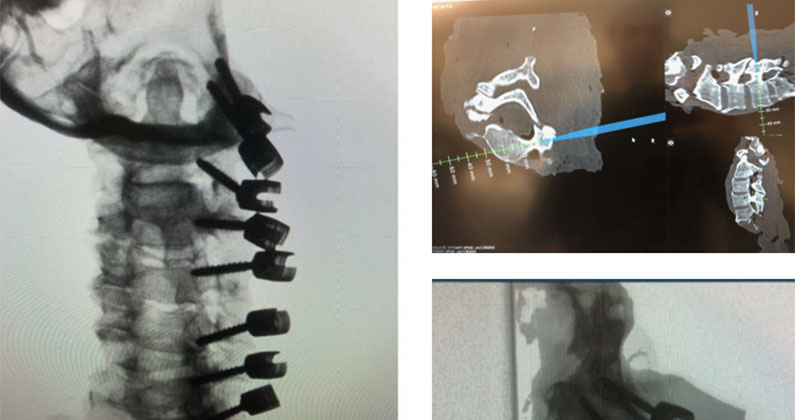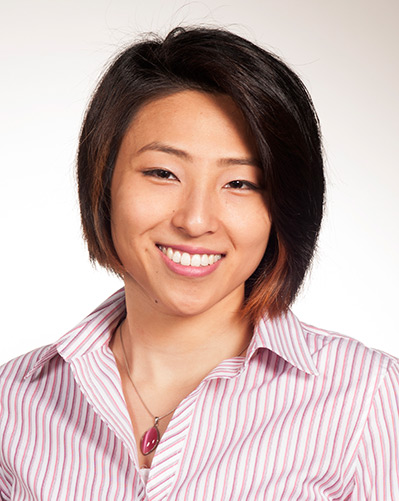Student Research Spotlight
Jennifer Mao (DO '21)
February 19, 2020 Jennifer Mao (DO '21) researches how machine navigation can effectively place cervical
pedicle screws during spinal surgeries.
Jennifer Mao (DO '21) researches how machine navigation can effectively place cervical
pedicle screws during spinal surgeries.
After graduating with a bachelor of science in biochemistry and a minor in computer
science from Temple University, Jennifer Z. Mao (DO ’21) began work as a quality assurance
engineer. After working for a year, Ms. Mao enrolled in Philadelphia College of Osteopathic
Medicine's (PCOM) dual-degree (MBA/DO) track and received her master of business administration
in 2018. Currently she is on a research year with the department of neurosurgery at
the University at Buffalo.
 What are you studying?
What are you studying?
Complex deformity surgeries are large surgical procedures that can encompass half
of your back. These long procedures can result in up to a liter of blood loss. If
the spine surgery fails, there are often consequences such as back pain, neurological
deficit and further surgery. With the aging population, astute spine management is
necessary. I seek to understand spinal biomechanics and how spinal surgery influences
complications, patient outcomes and biomechanical homeostasis of the spinal column.
Specifically, I am investigating the adult idiopathic scoliosis population to identify
factors for the optimal time for surgical intervention as well as surveying the experts
to identify rate of progression of the curve. I have and will be presenting my work
on Characterization, Management, and Outcomes of Adult Idiopathic Scoliosis at the
International Spinal Deformity Symposium in New York, New York and the Joint Section on Disorders of the Spine and Peripheral Nerves in Las Vegas, Nevada.
From my osteopathic education, I believe that when there is an imbalance or intervention in one region, it affects
the rest of the spinal column. Our bodies will compensate to maintain horizontal gaze.
This year I will also be presenting my work on the influence of approach on segmental
lordosis in spinopelvic correction with lumbar interbody fusion at the Joint Section on Disorders of the Spine and Peripheral Nerves in Las Vegas and at the 2020 American Association of Neurological Surgeons (AANS) Scientific Meeting in Boston. This study looks at different surgical approaches and how it affects the
amount of curve in the low back region. This is important as greater curve or “lordosis”
has been correlated with improved outcomes.
Additionally, the University at Buffalo is a leading center in spinal robotics. My
team and I are investigating how robotics and navigation can improve safety, accuracy
and efficacy to spine surgery. We seek to improve surgeon workflow to promote the
care of patients.
What experience do you have conducting research?
I worked as a computational research assistant in the Center for Chronic Disorder of Aging and the Kulathinal Lab in Evolutionary Genetics and Bioinformatics. During my undergraduate
studies, I built a pipeline to calculate statistical differences between large population
data sets (utilizing the 1,000 Genomes Project* data set) to investigate genetic diversity
across humans and chimps. During medical school I worked with IBM’s Joint Academic
Initiative to train a Watson instance for the improvement of curricula.
What prompted you to pursue research?
My love for research was serendipitous. Research is the study of discovering and explaining
new knowledge. From a medical perspective, we are taught how to analyze scientific
literature and draw conclusions based on presented evidence. From a business perspective,
we are taught about the importance and financial implications of clinical trials.
Formulating research proposals and grants is similar to writing a business proposal.
I pursued research because I have a fundamental passion for project management in
the healthcare sector driven by the desire to improve the care, treatment and outcomes
of patients.
What are your responsibilities on the research project?
As a research fellow, I collaborate with physicians and scientists to optimize research
designs. I submit the proposal for the institutional review board (IRB) approval,
collect data, analyze or interpret statistical results and work with the residents
for their clinical knowledge in manuscript preparation. I have a collaborative team
that allows me to work on various types of projects. I also work with video technicians
to record surgical cases to develop technical videos. Our studies have been and will
be presented at various neurosurgical and spine conferences, where we get feedback
from the community of spine specialists.
Furthermore, I’ve been given the opportunity to utilize my management skill set to
assist in clinical trials. I assist the research team in developing budgets, protocols
and patient follow-up appointments.
What is the broader impact of your research?
High quality evidence-based research will improve our knowledge of disease and treatment.
The impact of this research is to improve neurosurgical techniques, outcomes and care
of those who undergo spinal intervention. As technology improves, integration with
spine surgery will push the limits of healthcare.
About Philadelphia College of Osteopathic Medicine
Established in 1899, Philadelphia College of Osteopathic Medicine (PCOM) has trained
thousands of highly competent, caring physicians, health practitioners and behavioral
scientists who practice a “whole person” approach to care—treating people, not just
symptoms. PCOM, a private, not-for-profit accredited institution of higher education,
operates three campuses (PCOM, PCOM Georgia and PCOM South Georgia) and offers doctoral degrees in clinical psychology, educational psychology, osteopathic
medicine, pharmacy, physical therapy, and school psychology. The college also offers
graduate degrees in applied behavior analysis, applied positive psychology, biomedical
sciences, forensic medicine, medical laboratory science, mental health counseling,
physician assistant studies, and school psychology. PCOM students learn the importance
of health promotion, research, education and service to the community. Through its
community-based Healthcare Centers, PCOM provides care to medically underserved populations.
For more information, visit pcom.edu or call 215-871-6100.
Contact Us
For general media inquiries, please contact the Office of Marketing and Communications
at 215-871-6300 or communications@pcom.edu. Visit our media relations page to view contact information for public relations personnel.
Connect with PCOM

 Jennifer Mao (DO '21) researches how machine navigation can effectively place cervical
pedicle screws during spinal surgeries.
Jennifer Mao (DO '21) researches how machine navigation can effectively place cervical
pedicle screws during spinal surgeries. What are you studying?
What are you studying?